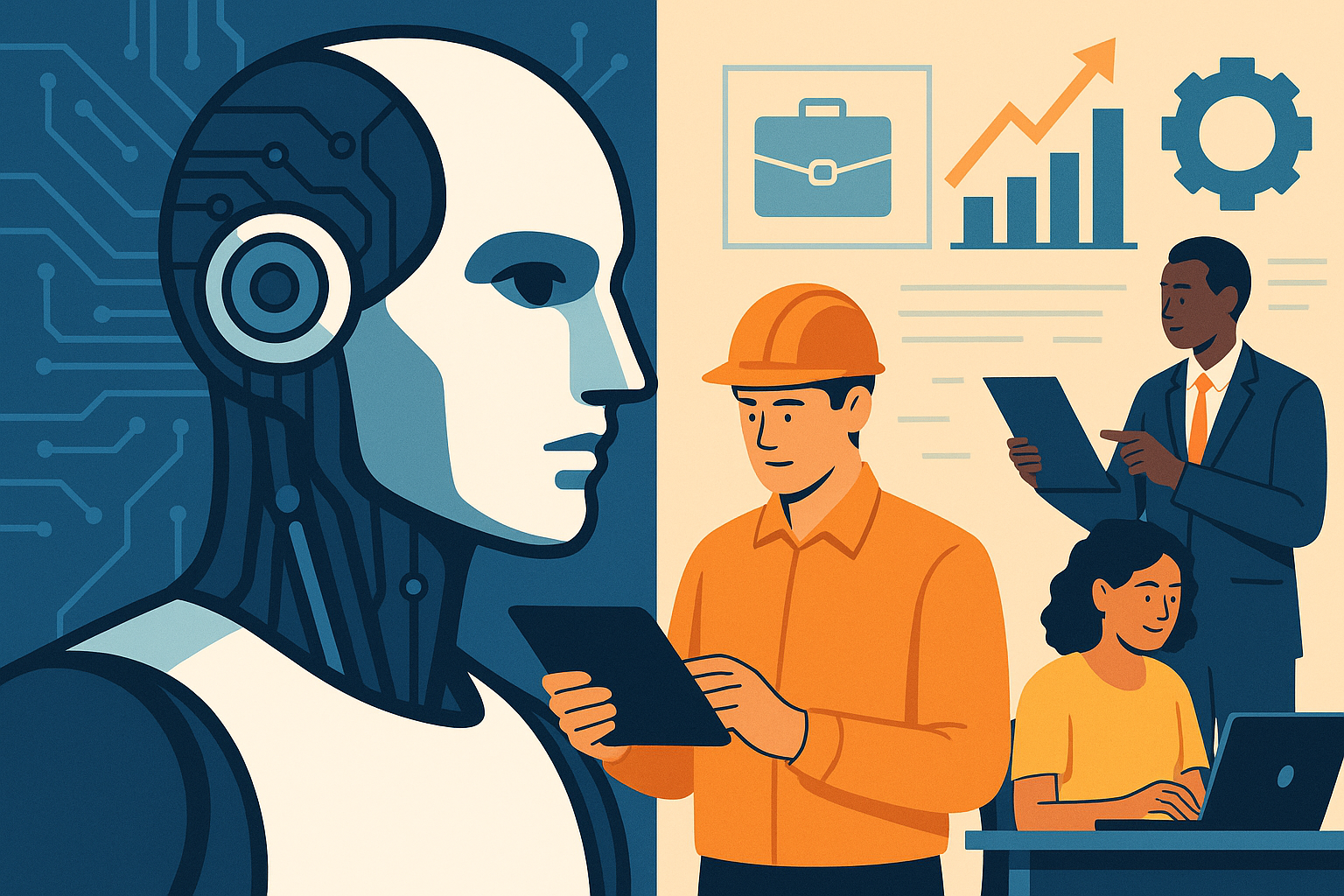In today’s rapidly evolving digital world, artificial intelligence (AI) is no longer just a buzzword—it’s becoming a vital part of our daily work lives. Whether you’re a marketer, teacher, freelancer, or factory worker, chances are you’re already witnessing or experiencing how AI is changing jobs around you.
This transformation isn’t about replacing humans with machines. Instead, it’s about collaboration—AI working alongside us to eliminate repetitive tasks, boost productivity, and unlock new levels of creativity and decision-making. Let’s dive into 10 powerful ways AI is changing everyday jobs across industries.
1. Automating Repetitive Tasks
From sorting emails to managing calendars and data entry, AI is streamlining mundane tasks. Tools like Zapier, ChatGPT, and Notion AI are helping professionals save hours each week. This means more time for meaningful, strategic work and less burnout from repetitive chores.
How AI is changing jobs: By handling admin work, AI frees up employees to focus on creativity and innovation.
2. Smarter Decision-Making with Predictive Analytics
AI-driven tools analyze massive data sets in seconds, offering insights that were once nearly impossible to uncover manually. Whether you’re in marketing, logistics, or HR, AI helps you make data-backed decisions—faster and with more confidence.
Example: AI in retail predicts shopping trends, helping brands stock better and reduce losses.
3. Personalizing Customer Experience
Have you ever received a personalized product recommendation or email that felt just right? That’s AI at work. From chatbots to customer behavior prediction, AI enables businesses to engage customers more meaningfully and improve satisfaction.
How AI is changing jobs: Customer service teams now manage escalated queries while AI handles FAQs, improving service speed and quality.
4. Enhancing Hiring and Recruitment
AI is revolutionizing human resources by screening resumes, identifying top candidates, and even conducting initial assessments. Tools like HireVue and Pymetrics use algorithms to reduce bias and accelerate hiring.
Bonus: HR professionals can now focus more on culture building and less on paperwork.
5. Empowering Content Creation
Freelancers, writers, and creators are now co-creating with AI. Platforms like Canva AI, Jasper, and ChatGPT assist with content ideas, drafts, and design elements—reducing creative blocks and enhancing productivity.
How AI is changing jobs: Creatives spend less time stuck and more time delivering high-quality output quickly.
6. Improving Healthcare Delivery
Doctors and nurses are turning to AI to read scans, diagnose illnesses, and even predict disease outbreaks. AI-driven platforms support faster diagnostics and patient care, reducing pressure on frontline workers.
Example: IBM Watson can review thousands of medical papers in seconds to suggest treatment options.
7. Optimizing Manufacturing and Supply Chains
Robotics, predictive maintenance, and smart sensors powered by AI are making factories more efficient. Workers now oversee machines and handle complex tasks instead of repetitive manual labor.
How AI is changing jobs: Factory roles are shifting from labor-intensive to supervision and decision-making.
8. Transforming Education and Tutoring
AI in education is personalizing student learning, automating grading, and supporting teachers with smarter planning. Tools like Khanmigo, Quizlet AI, and Socratic help students learn at their own pace.
Bonus for teachers: More time to engage with students, less time marking assignments.
9. Boosting Productivity in Remote Work
Remote teams use AI for task management, meeting transcription, and workflow automation. Virtual assistants now schedule meetings, write emails, and summarize Zoom calls—saving time and effort.
How AI is changing jobs: Teams are more connected, efficient, and less bogged down by busywork.
10. Opening Doors to New Career Paths
AI isn’t just changing existing jobs—it’s creating entirely new roles like AI trainers, prompt engineers, and automation consultants. Professionals are reskilling to fit into these futuristic roles and stay ahead of the curve.
Pro tip: Platforms like Coursera and Udemy offer AI literacy programs for beginners.
Why It Matters: Adapting to the AI Era
Understanding how AI is changing jobs is crucial—not just for techies, but for every working professional. AI is no longer optional; it’s a tool we must learn to collaborate with.
The good news? You don’t need to be a coder to thrive in this AI-driven world. You just need curiosity, adaptability, and a willingness to learn how these tools work.
Practical Tips to Thrive in an AI-Driven Job Market
- 🔹 Stay updated on AI trends in your industry.
- 🔹 Start using at least one AI tool weekly in your workflow.
- 🔹 Upskill with free or affordable AI courses.
- 🔹 Focus on creative and strategic work—AI handles the rest.
Conclusion
As AI continues to evolve, so will our jobs. Instead of fearing the change, we should embrace it as an opportunity to enhance our skills, free up time, and do more meaningful work. The future isn’t man vs machine—it’s man + machine.
The key to staying relevant is to understand how AI is changing jobs, adopt the tools that serve your profession, and stay curious about what’s coming next.



